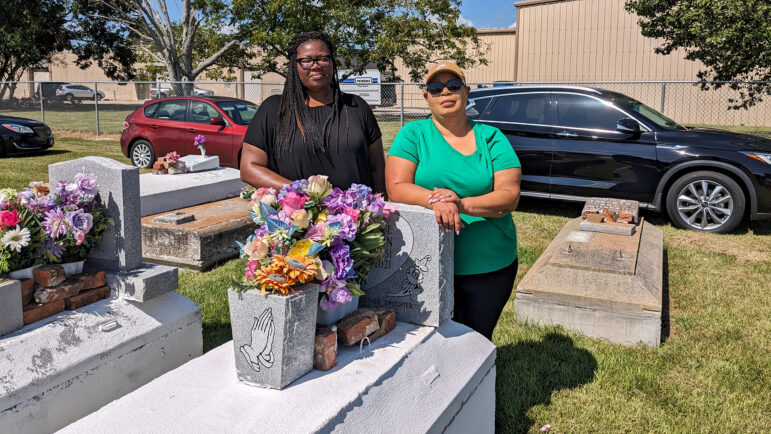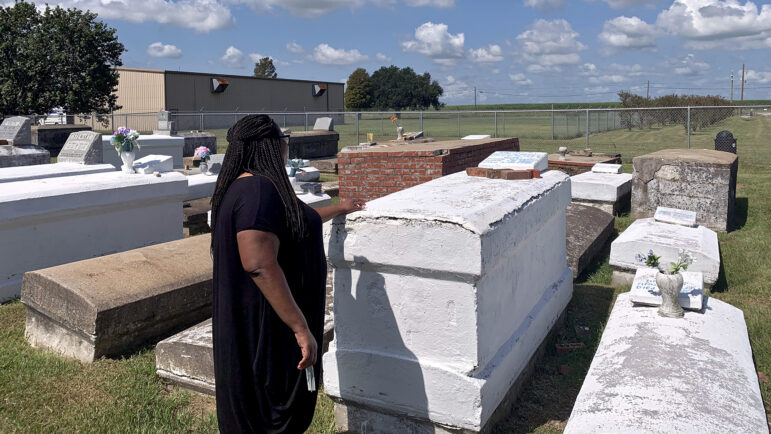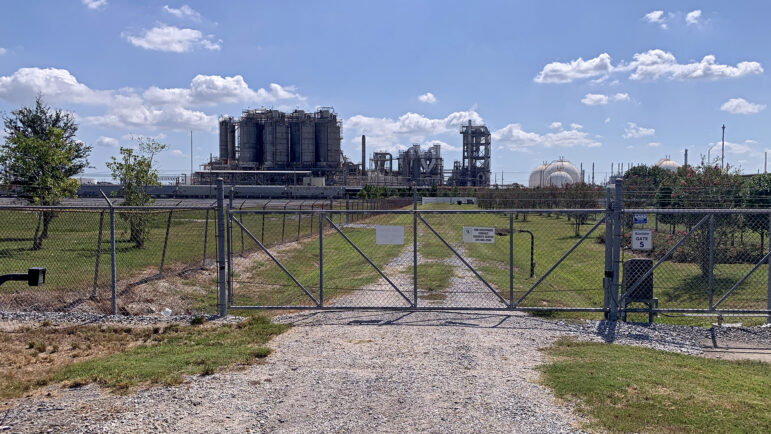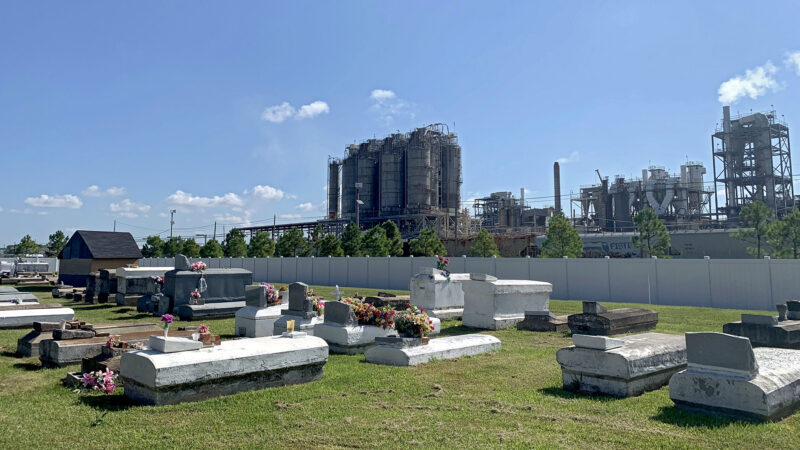Place, Erased: The fight for the remains of a Louisiana town
The Revilletown cemetery in Plaquemine, Louisiana, on September 6, 2023. The cemetery lies right next to a chemical plant owned by Westlake Corporation.
This story is part of a series from the Gulf States Newsroom called Place, Erased. Reporters traveled to communities in Mississippi, Alabama, and Louisiana that have been transformed by major environmental shifts. You can read other entries in the series here:
- Place, Erased: How a drowned Alabama town still holds lessons 60 years later
- Place, Erased: Is this Mississippi community really a ghost town? It depends on who you ask
Standing in the Revilletown cemetery in Plaquemine, Louisiana, under the blazing September sun, Marla Dickerson and her sister, Cheryl Batiste, place new flowers in the urn next to their mother’s grave. The graveyard is neat and tidy, and it’s small — about one-quarter acre in size.
In the South, cemeteries are often more than just burial grounds. They’re active places, full of life. Traditions like “Decoration Day,” where families gather to clean and decorate the graves of their loved ones, still hold strong. And for those with connections to Revilletown — a small, Black community in rural Louisiana — the cemetery was a place of refuge.
Dickerson wipes beads of sweat from her forehead and places her hand on the above-ground tomb. As a child, she used to run around and play here. Now, as she looks over the graves, she’s overcome with emotion as she remembers some of the stories her grandmother used to tell her.
“She and her brother would walk to school, and the white kids would pass by on the bus, and spit at them and throw things at them. And her brother would stop here to eat his lunch because he didn’t want to have to deal with everything going on,” Dickerson said, pausing to catch her breath and steel herself before continuing.
“So we would have walks and we would come here and we would just sit down and she would point out where all the family members were buried. So it wasn’t ever a sad occasion, it was just something that we did to celebrate our family.”
As she talks, Dickerson has to speak loudly over the constant drone of the chemical plant right on the other side of the fence. Giant, steel storage tanks and smokestacks with steam billowing out of them tower over the graves.
“There is nothing peaceful about being near a chemical company,” Dickerson said.
Generations of Dickerson’s family are buried in the Revilletown cemetery, which is now all that remains of the small town she grew up in — until dangerous levels of toxic pollution pumped into the air, soil, and water by the chemical plants forced residents to leave.
Now, even the bones of Revilletown are in jeopardy, as the chemical companies that have operated the plants next door have tried claiming ownership over the graveyard throughout the years.
But residents aren’t letting their former home become a full specter without a fight.
‘The water would turn different colors’

Revilletown was founded in 1881 by formerly enslaved people who pooled what little money they had and purchased the land on the banks of the Mississippi River, about 20 miles outside of Baton Rouge.
When you start a town, you need a place to bury your dead, so the cemetery was established where it exists today. Marla Dickerson even has a copy of the original, handwritten deed. Her great-great-great-grandmother is buried here.
For decades, Revilletown was a close-knit community with about 100 or so residents. Dickerson said it was a happy, peaceful town — small, with two streets. Most of the residents were related in some way, either by blood or marriage. But then, in the mid-1970s, the community got some new neighbors.
Georgia-Pacific saw the region as ideal, an almost ready-made port with access to vast resources ranging from the corn and grain fields of the Midwest to the oil and gas buried in the swamps along the Gulf Coast. But the real jackpot for the company was the salt domes that layer south Louisiana. Formed by prehistoric inland oceans, the salt domes are loaded with chlorine — a vital component for the production of industrial products like plastic and fertilizer.
Georgia-Pacific opened its first large-scale chemical plant about 1,000 feet from Revilletown. The company would construct more plants on the site over the next few years, running salt extracted from the nearby domes through water to take advantage of the chemical processes that can produce vinyl compounds like polyvinyl chloride (PVC) to create siding, flooring, shower curtains, pipes and more industrial products.
But as the site grew, it also started to pump out more pollution, and Revilletown residents started to notice. Marla Dickerson remembers seeing a white powder — PVC — spew out of the plant, covering everything in a fine layer of dust.
“You can see white speckles on everything because they’d be releasing it,” Dickerson said. “Everyone who was my grandmother’s age had a garden, but then plants started to die, grass started to die, and the water would turn different colors.”
All that remains

Enter Janice Dickerson, Marla’s mother. In Louisiana, Janice Dickerson is known not just as an iconic civil rights activist, but also as a pioneer for environmental justice. She literally wrote the book on it, drafting, developing, and implementing the first and only environmental justice program in the state.
But in Revilletown, she was just another concerned resident.
Dickerson saw what was happening to her community and took action, getting the Environmental Protection Agency involved. Researchers found toxic levels of pollution in the air, soil, and water. Lab work done on children in the community also found evidence of exposure to vinyl chloride gas — a colorless, flammable gas that’s used to make PVC. Exposure can damage the liver, kidneys, lungs, spleen, nervous system and blood.
Armed with this information, the residents of Revilletown filed suit against the chemical company. In 1987, they settled with Georgia-Pacific, who by then had changed its name to Georgia Gulf. As part of the settlement, the company paid to relocate the town. After the residents were gone, Georgia Gulf then bulldozed all of the buildings, leaving nothing behind.
In the years since the town was demolished, Georgia Gulf changed its name once more to Axiall Corporation before it was then sold to its most recent owner — Westlake Corporation, a multi-billion dollar, international company.
Today, Revilletown is gone. The cemetery is all that remains, and the community wants to keep using it to continue being buried alongside their ancestors.
But they soon ran into another legal problem.
Before the sale to Westlake Corporation, Axiall Corporation decided to claim ownership over the property. Dickerson and the now-former residents of Revilletown sued Axiall for control over the cemetery, later including Westlake in the lawsuit once the sale was made.
‘A complicated issue’
The legalese is complicated, but essentially, the chemical companies say that when they bought the land to build chemical plants, the cemetery was included in the title. There are also other legal issues such as possession or possessed reactions, which aren’t technically ownership — but could give the companies control over the cemetery.
“They were claiming that they had possessed it because in order to possess it, you can just simply, in some instances, enclose a piece of property with a fence, and, depending on the circumstances, you’re possessing the property,” said Chris Meeks, an attorney who worked with Janice Dickerson. “Our argument was that we have always been doing acts of possession by maintaining the cemetery, cutting the grass, burying members of the community there and also keeping their dead bodies in that cemetery.”
Meeks said he’s an experienced attorney who has handled many property lawsuits, and it took him at least six months to wrap his head around the factual legal issues in this case. For instance, a court ruled that the original, handwritten deed that Marla Dickerson has doesn’t hold up because there are no other records of the legal entity that purchased it and no one alive to attest to the sale.
“Of course, it was always very simple to Janice,” Meeks said. “We’ve always been telling our people, our ancestors are there. My mother’s there, everyone is there. So how can this possibly be a complicated issue?”
The lawsuit and subsequent appeals to it dragged on for years, and while they were ongoing, nobody could be buried in the cemetery — and the chemical companies would go out of their way to uphold that.
Local law enforcement once stopped a woman’s funeral in progress, leaving a freshly dug grave open. The deceased had to be taken back to the funeral home, where she sat for a week — over the Thanksgiving holiday — while her family tried to figure out what to do. Janice Dickerson was there and told local TV reporters that she tried to stop them, saying, “They will not take this grave over my dead body.”
In the end, the woman’s family wasn’t able to bury her next to her husband, like she wanted.
When asked about stopping the funeral and why it asserts ownership over the cemetery, Westlake Corporation did not directly answer the question. Instead, the company said it “is not a cemetery operator. However, the plant maintains and secures a historic cemetery located on its property.” The company said it follows “principles” designed to “preserve the dignity and sanctity of those who are buried in the cemetery; protect the public while also allowing reasonable access to the cemetery; ensure compliance with existing federal and site access requirements.”
The lawsuit was brought to a halt when Janice Dickerson, herself, died in 2021. Once again, the chemical companies stepped in and tried to stop her from being buried there.
Meeks said it was a scary time and both he and the Dickerson family lost a lot of sleep over it. They decided to make the agonizing choice to drop the case so that Janice Dickerson — the woman who had fought for Revilletown and the cemetery for her entire life — could be buried next to her ancestors. At the last minute, the court agreed to dismiss the case and allow Dickerson to be buried in the cemetery.
Long, racist legacy

Unfortunately, the story of the Revilletown cemetery isn’t unique. There is a long, racist legacy of Black land theft and Black cemetery erasure in the U.S. — especially in the Deep South.
Meeks said that, as a white attorney, working with Janice Dickerson forced him to confront biases that he didn’t realize were there before, and forced him “to recognize the struggles that Black people face.”
He said the fact that the Revilletown cemetery is a Black cemetery has created more obstacles and challenges than he’s faced in other property lawsuits.
“I have to say that I don’t I don’t think a historically white cemetery would face even a tenth of these troubles,” he said. “I just don’t believe that. I don’t think that would happen if these were white people complaining now.”
Meeks said he and Marla Dickerson are planning additional legal action, continuing to fight until the descendants of Revilletown have complete control over the cemetery and their ancestors can finally rest in peace.
For Marla Dickerson, there is no other choice.
“I think about the stories that Mama told me, about the stories of my grandmothers, the great grandmothers, the great aunts who are also buried back here,” she said. “ I think about the strength and the power that they had living. I would be remiss if I did not carry on and tap into the strength and power of the spirits that surround me every day to make sure that they are able to continue to rest in peace.”
This story was produced by the Gulf States Newsroom, a collaboration between Mississippi Public Broadcasting, WBHM in Alabama, WWNO and WRKF in Louisiana and NPR.
40 years after ‘Purple Rain,’ Prince’s band remembers how the movie came together
Before social media, the film Purple Rain gave audiences a peak into Prince’s musical life. Band members say the true genesis of the title song was much less combative than the version presented in the film.
Park Fire in California could continue growing exponentially, Cal Fire officer says
Cal Fire has confirmed that over a hundred structures have been damaged in the Park Fire, which grew overnight near Chico, Calif. Difficult firefighting conditions are forecast through Friday night.
Checking in with Black voters in Georgia about the election, now that Biden is out
Some voters who could be key to deciding who wins Georgia. What do they think about Vice President Harris becoming the frontrunner in the race to be the Democratic nominee?
Tahiti’s waves are a matter of ‘life and death’ for surfing Olympics
Tahiti's Teahupo'o wave has a slew of riders for the Paris 2024 Olympics. NPR finds out why it's called one of the most dangerous waves.
Researchers are revising botanical names to address troubling connotations
Since the mid-1700s, researchers have classified life with scientific names. But some of them have problematic histories and connotations. The botanical community is trying to tackle this issue.
A spectacular opening ceremony wowed a global audience despite Paris’ on-and-off rain
The Paris Olympics opening ceremony wowed Parisians, fans and most everyone who was able to catch a glimpse of thousands of athletes floating down the Seine to officially begin the Games.



